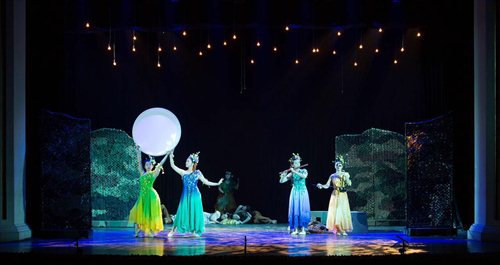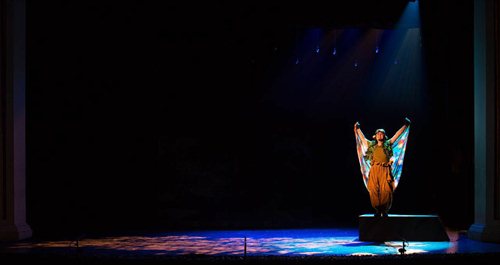A Midsummer Night’s Dream
Shakespearean comedy meets Shanghai farce
In the audacious trial of Shanghai Farce Troupe, Shakespeare's love comedy A Midsummer Night's Dream, written in the 1590s, becomes a relevant and enjoyable show for Chinese audiences, especially those who understand a little bit of the Shanghai dialect.
On the occasion of the Bard's 400th death anniversary, the troupe collaborated with British TNT Theatre and produced this special stage version of A Midsummer Night's Dream, which runs at Lyceum Theatre until Friday.
It's special because it's not a usual Shanghai-dialect and -style farce, but rather a play adorned with elements of Shanghai farce.
The production is mainly in Putonghua, while Shanghai dialect only appears from time to time as bonus surprises for the audience.
Shakespeare's script isn't altered too much, loyally following the three major threads - Athenian lovers, the fairies and a group of actors - while boldly infusing modern civilization and a sense of Shanghainese humor.

Pop-culture delights
It should be a major challenge to make a classic script still intriguing for contemporary audiences, considering that people are so familiar with the story and know every twist in it.
In this sense, the play is successful, especially in the first half of the show. By introducing a wide array of pop-culture elements, it managed to arouse constant laughter from both children and adult viewers at a recent performance.
Oberon, King of Fairies, communicates with Puck, a spirit, by mobile phone, while the amateur performers' group in the script always brings with them a refrigerator to store drinks during the rehearsals.
Men's love unexpectedly becomes another comic element in the play. Egeus wants to marry his daughter Hermia to Demetrius, a man she doesn't love, because Egeus very much likes Demetrius personally, and he wants to share with him everything he owns, including his daughter.
Hippolyta, Queen of the Amazons, becomes a masculine woman acted by a male performer, and the romance between her and Theseus, the Duke of Athens, surprisingly started on a battlefield where Theseus, dressed in camouflage uniform, makes her a captive.
Trendy slang in Chinese society together with Shanghai dialect also prove as efficient jokes. The Shanghai dialect is easy to pick up, as many of the terms are typical expressions of daily life in the city.

(From top) Scenes from A Midsummer Night's Dream produced by Shanghai Farce Troupe Photos: Courtesy of SMG Live
Actors stand out in old story
Co-directed by Paul Stebbings and Eric Tesssier-Lavigne from TNT Theatre, the play features a hybrid cast of professional farce performers, general theater actors and traditional Chinese instrumentalists.
Among the 15 cast members, only six are from Shanghai Farce Troupe; the others were selected from around the country through auditions.
The mixture turns out to be a powerful cast with superb acting craft. Most of the performers play more than one role in the show, and they deliver the specialty of each character with proper vigor.
Thus audiences can see actress Zhao Dan switch within seconds between the elegant Hermia and a clumsy amateur actor, while Xia Tianheng deftly delivers the roles of a retarded actor and the self-conceited spirit Puck.
Compared with their excellent facial expressions and performance, the chorus of the actors lags behind the lively atmosphere of the show. The chorus is comparatively weak in singing, and their lyrics are also delivered unclear.
Stebbings told media before the show that he would not abridge any part of the original story, and the play turns out to be 160 minutes long. (There is a 10-minute intermission.)
Even though the energetic actors manage to tickle the audience from time to time, it still seems a bit too long to appreciate a familiar story, especially when the latter half seems to repeat bits used earlier.